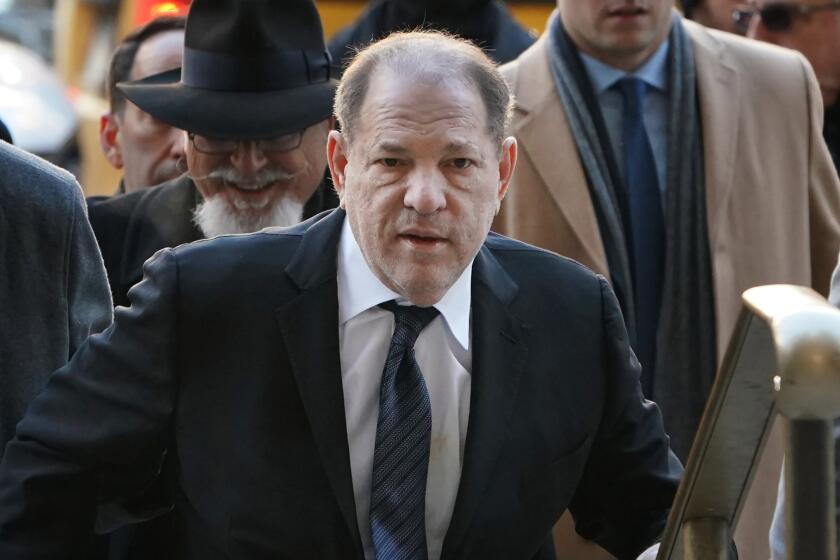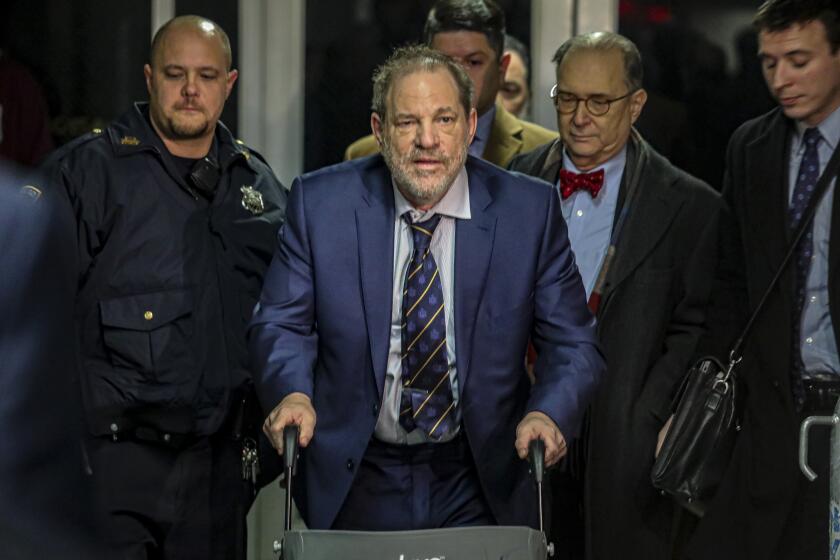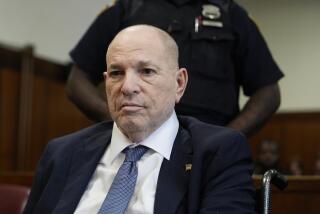Harvey Weinstein found guilty of rape in sexual assault trial

NEW YORK — Harvey Weinstein was found guilty of rape and a felony sex crime Monday, marking a climactic end to a high-profile case that in some ways serves as vindication of the #MeToo movement.
Those two counts were connected to individual allegations made by Mimi Haley, a former Weinstein Co. production assistant, and Jessica Mann, a once-aspiring actress. Weinstein was acquitted on the two most serious charges of predatory sexual assault, which each carried a potential life sentence.
Weinstein, 69, appeared to be staring ahead while a half-dozen court officers surrounded him just after the verdict was delivered. The movie producer struggled to get up from his seat as he was handcuffed and escorted out of the courtroom.
Judge James Burke ordered Weinstein to be held in custody until his sentencing March 11.
Late Monday, Weinstein was taken to Bellevue Hospital with chest palpitations and high blood pressure, his attorney said. She said he is expected to be OK.
Manhattan Dist. Atty. Cyrus Vance Jr. listed the names of the six accusers who testified during the trial, as well as the prosecutors who brought Weinstein to justice: Joan Illuzzi-Orbon and Meghan Hast.
“These are eight women who pulled our justice system into the 21st century,” Vance told a swarm of reporters.
Women’s rights groups and actresses who have accused Harvey Weinstein of sexual abuse described feeling a wave of relief and camaraderie on Monday after a jury found the producer guilty of one count of rape and one count of committing a criminal sexual act.
Weinstein’s lead attorney, Donna Rotunno, said Weinstein was “shocked” and that he would appeal the decision.
The jury deliberated for five days after listening to weeks of emotional testimony from a half-dozen women who said that the fallen Hollywood titan used his influence and the promise of potential acting roles to lure them to isolated locations, where he then forced himself on them after they resisted his advances.
Prosecutors did not have forensic evidence or corroborating witnesses to any of the assaults, and Weinstein’s defense attorneys had insisted each alleged encounter was consensual. But after a case that was in many ways considered the culmination of the #MeToo movement, the jurors ultimately chose to believe the women’s accusations over the protestations of their alleged rapist.
Though the charges were based on the allegations of two women, the shadow of the many others who had come forward loomed over the case from the start. Jurors were chosen specifically for their professed ability to ignore media coverage and decide the case based only on evidence heard in court.
During the six-week trial, a physically diminished Weinstein shuffled in and out of a 15th-floor courtroom with the aid of a walker. He appeared stoic as six accusers testified; they faced hours of cross-examination, and some broke into tears as they recounted their alleged encounters with the once formidable movie producer.
Weinstein did not testify in his own defense, so prosecutors were unable to interrogate him about his alleged conduct. But Weinstein and his lawyers have insisted that his encounters with the women were consensual.
The downfall of Harvey Weinstein was groundbreaking for the entertainment industry. On Monday, a jury convicted Weinstein on two charges. But has Hollywood enacted meaningful change?
Most of the women said the alleged assaults began under the pretext of a professional relationship. Weinstein would express interest in each woman’s acting career or a script they were writing before inviting them to his hotel room or Manhattan apartment, they said.
Annabella Sciorra, the Brooklyn actress best known for her role in “The Sopranos,” said Weinstein offered her a ride home from an industry dinner in Manhattan in 1993 or 1994. The two had met several times but never flirted or discussed the possibility of a romantic relationship, Sciorra said.
But moments after she was dropped off at her Gramercy Park apartment building, Weinstein knocked on the door and barged his way in, she said.
He began unbuttoning his shirt and lunged forward, even though the actress told him to leave, according to Sciorra. She said she punched and kicked Weinstein to no avail.
“I was just trying to get him away from me and he took my hands and he put them over my head,” Sciorra said. “He got on top of me and he raped me.”
Sciorra’s allegation was too old to prosecute individually, but it was factored into the top count of the indictment. To convict Weinstein of predatory sexual assault, jurors had to believe the mogul assaulted Sciorra and one of two other accusers: Haley or Mann.
After four days of deliberation, the jury asked Burke if they could deadlock on the predatory sexual assault counts, but reach a unanimous decision on the individual allegations made by Haley and Mann. The question was posed only as a hypothetical, but Burke ordered them to continue deliberating.
Haley, a former production assistant on the Weinstein Co. show “Project Runway,” said she first met Weinstein in 2004 and repeatedly rebuffed his advances. But she agreed to meet Weinstein at his SoHo apartment in 2006 out of fear she had damaged her relationship with the powerful Hollywood figure, she said.
What started as a casual conversation spiraled out of control when Weinstein attempted to kiss her, she testified last month. Weinstein, who prosecutors said weighed more than 300 pounds at the time, used his bulk to back her into a bedroom, hold her down her arms and forcibly perform oral sex on her, Haley said.
In court, she remembered saying “No” repeatedly, and then realizing she was being raped.
After Haley and Sciorra testified, Mann took the stand, describing a lengthy and abusive relationship with Weinstein. While some of their encounters were consensual, the once aspiring actress also accused Weinstein of raping her on two separate occasions in hotels in New York and Southern California.
“He could lift you up to anyone he introduced you to and then behind closed doors it was … dependent on if I gave him what he wanted,” Mann said.
The verdict in Weinstein’s New York rape trial could help L.A. County prosecutors secure a conviction against the disgraced movie mogul in California.
Mann’s testimony lasted three days. When lead defense attorney Donna Rotunno cross-examined her about possibly suffering sexual abuse as a child, Mann broke into sobs and had to be escorted from the courtroom.
The Washington state native said that while she was never sexually attracted to Weinstein, she felt “compassion” for him and wanted his approval in her acting career.
But the relationship turned violent in a New York City hotel in 2013, Mann said, when Weinstein grabbed her and dragged her into a room, she said. Once inside, he physically barred her from leaving, she told the jury.
Mann said she “gave up” and had sex with Weinstein against her will.
Months later, Mann said she tried to end her relationship with Weinstein at a Beverly Hills hotel when she told him she had fallen in love with someone else.
Weinstein became enraged, picked her up from a chair and then violently raped her, she said.
Three other women, whose allegations were either too old to prosecute or happened outside the jurisdiction of Manhattan prosecutors, also testified against Weinstein. Dawn Dunning claimed Weinstein slipped his hand up her skirt against her will in 2004, and then later offered her a number of movie roles if she promised to have a threesome with the mogul and his business assistant.
Tarale Wulff, who once worked as a waitress at a swank Manhattan club, claimed Weinstein masturbated in front of her at the restaurant and later forcibly raped her in 2005. Lauren Young, whose allegations led to criminal charges against Weinstein in Los Angeles, accused Weinstein of trapping her in a hotel bathroom then groping her while he masturbated.
Throughout the trial, Weinstein’s defense attorneys sought to undermine the veracity of each woman’s narratives. Rotunno and Damon Cheronis highlighted some accusers’ inability to recall exact dates and times of the alleged assaults, or confronted them with e-mails and other evidence that they stayed in contact with the mogul after the alleged violent rapes they described.
And the defense insisted that the women were not victims, but opportunists seeking connections and acting roles.
Before the verdict was delivered, some legal experts predicted that the accusers’ continued contact with Weinstein could pose problems for the prosecution.
Haley and Mann both had consensual sex with Weinstein after the alleged assaults, the defense argued. Cheronis said Mann was actually in a “loving relationship” with Weinstein rather than the hellish dynamic she described, and Rotunno produced e-mails showing Haley once offered to introduce the mogul to her mother.
E-mails presented by Rotunno showed Mann turned to Weinstein when her father died and during a difficult breakup.
“The person you chose to reach out to was the person you claimed sexually assaulted you,” Rotunno said. “You reached out to Harvey because you wanted to see him.”
Trauma experts have said a sexual assault victim might stay in touch with their abuser because of financial dependence or, in Weinstein’s case, because he held power over them in Hollywood.
A witness for the prosecution, forensic psychiatrist Barbara Ziv, attempted to knock down so-called rape myths — including the notions that the truthfulness of a rape allegation can be evaluated by how an accuser behaves afterward.
During her closing arguments, Rotunno said that the women made the choice to interact with Weinstein, and that prosecutors had “created a universe that strips ... adult women of common sense, autonomy, and responsibility. It’s offensive, actually.”
In her closing argument, prosecutor Joan Illuzzi-Orbon pushed back against the idea that staying in touch with an alleged abuser means that the abuse didn’t happen.
“The question is not whether Jessica Mann made a bad decision,” Illuzzi-Orbon said. “The question for you is whether or not Jessica is lying. If she’s telling you the truth, she’s the victim of rape.”
Social advocacy group Time’s Up said in a statement that the verdict marked just one victory in a long fight for systemic change.
““While we celebrate this historic moment, our fight to fix the broken system that has allowed serial abusers like Harvey Weinstein to abuse women in the first place continues,” the statement said. “Abusers everywhere and the powerful forces that protect them should be on notice: There’s no going back.”
Weinstein will next answer to four more counts of rape and sexual battery charges in Los Angeles.
More to Read
Sign up for Essential California
The most important California stories and recommendations in your inbox every morning.
You may occasionally receive promotional content from the Los Angeles Times.














